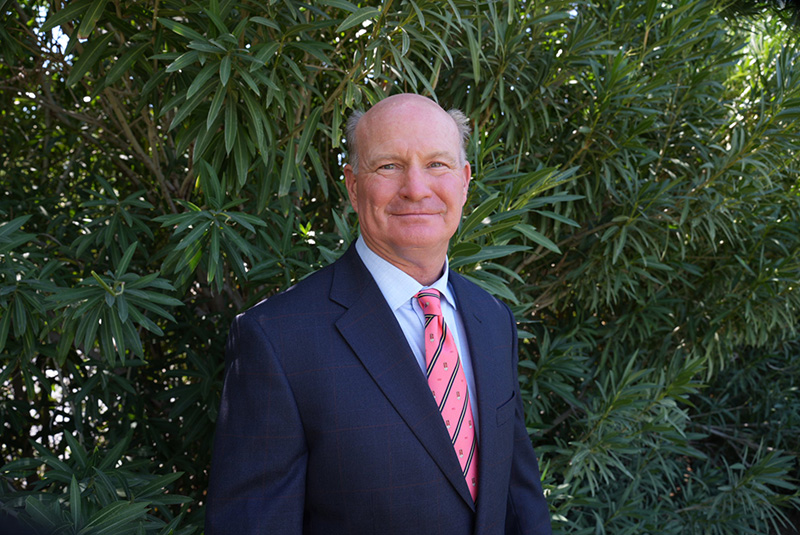
Rob Collins is the GCSAA Class A superintendent at Paradise Valley Country Club in Paradise Valley, Ariz., and a 34-year GCSAA member. Photos courtesy of Rob Collins
Paradise Valley Country Club suffered quite a shock in 2006.
The Phoenix-area golf course was forced to completely stop watering about 10 acres of its land as the state more strictly enforced its water-use regulations.
“The state went through a period of enforcement, and there were a number of golf courses that had exceeded their flexibility account,” recounts Paradise Valley CC’s GCSAA Class A superintendent, Rob Collins, a 34-year GCSAA member.
“Instantly we turned off about 10 acres’ worth of water. We had massive 40- and 50-year-old trees die, and turf died. That was a difficult experience for me and the club,” Collins says. “When you ask, ‘How did I become involved in water conservation?’ It was out of need and due to that experience.”
Nearly 20 years later, Collins is being inducted into the Arizona Golf Hall of Fame by the Arizona Golf Association on Oct. 22, primarily for his leadership in conservative water-usage techniques.
“It means so much to me that our Arizona golf community continues to recognize the golf course superintendent,” Collins says. “The hall of fame committee has nominated and inducted superintendents for many years. I feel very honored to be inducted into the Arizona Golf Hall of Fame.”
Currently, Collins is the Arizona Alliance for Golf’s Water Policy committee chairman, actively engaging in discussions with the Arizona Department of Water Resources to develop practical water regulations for the state's commercial users. He has also held several roles with Cactus & Pine GCSA.
Paradise Valley came through that difficult period of irrigation restrictions two decades ago charting a new course of water conservation that continues today.
“We faced a tough decision then: How do we fix this?” Collins says. “And at first glance, you’d think that’s really easy — just take out some turf, and we’ll be on our way. It turns out to be a lot more than that. We dug into the efficiency of irrigation systems in distribution uniformity.”

Collins, who is being recognized for his leadership on water conservation, is the 11th superintendent to be inducted into the Arizona Golf Hall of Fame.
Collins says the club’s irrigation system wasn’t that old, but it had to be replaced; it was designed for flexibility, not for water conservation. The maintenance team asked the two primary irrigation manufacturers for a guaranteed performance standard.
“We said, ‘We want you to guarantee 80% distribution uniformity.’ We knew to achieve our water-use goals, we had to have confidence in the direction we were going. It was going to be nearly a $2 million decision,” Collins says.
“Fortunately, after the irrigation renovation, we came well within our (water-use regulation) allocation and have stayed within it ever since, nearly 20 years later.”
To better understand just how efficient and effective his irrigation system is, Collins says, he uses a technology called time domain reflectometry, as well as handheld moisture meters and probes to check volumetric water content in soil and “evaluate how the golf course dries down — it’s not uniform,” he says.
“I think there’s maybe a misperception by superintendents that by achieving distribution uniformity, your irrigation system is the holy grail to effective water management. But the truth is, the golf course doesn’t dry down uniformly across the property. You want distribution versatility. You want to be able to respond to changing drying conditions on your golf course,” Collins says.
The golf season at Paradise Valley runs November through May, with the course consisting of perennial ryegrass overseeded on bermudagrass. Collins and his team have also reduced the amount of irrigated turf on the course bit by bit. Paradise Valley had 122 irrigated acres. Now it’s down to 96 acres. Soon it will be 90.
“It’s trying to decide what to do to preserve the character of the golf course but also ensuring that we’re going to meet the water regulation — those are the difficult decisions,” Collins says.

Under Collins' leadership, Paradise Valley Country Club went from 122 irrigated acres to 96, with further reductions to come.
The prospect of additional water-use restrictions is always on the horizon. Water customers will enter another phase of tiered reduction in water allocations under the Groundwater Act in January 2025. So, like many golf courses, Paradise Valley continues to experiment with new conservation methods.
“Playing golf on growing grass is always going to perform best,” Collins says. However, “There’s no question that there are a number of golf courses in Arizona that are seeking alternatives to overseeding,” he says, “and I think doing a great job finding varieties of bermudagrass that use less water that maybe produce excellent year-round conditions.”
“At Paradise Valley, we are investigating zoysiagrass and considerably reducing our overseeded footprint. It’s our experience that zoysiagrass as a non-overseeded turf appears to do really well and maybe better than bermudagrass.
“So all these things are happening in Arizona and the Southwest with regard to water use. Many of us are seeking alternatives and trying new things with regard to water use and golf. And I’m here to see where that goes,” Collins says. “In 10 or 20 years, I’m sure that’s going to look much different.”
Before Collins became superintendent at Paradise Valley in 1995, he was superintendent at Forest Hills Country Club in Chesterfield, Mo. Before that, he was assistant superintendent at Troon Golf and Country Club in Scottsdale, Ariz. Before that, he interned two years at Muirfield Village Golf Club in Dublin, Ohio.
Collins will become the 11th superintendent to be enshrined in the Arizona Golf Hall of Fame and the first since Mark Woodward, CGCS, in 2021.
Phil Cauthon is GCM’s managing editor.